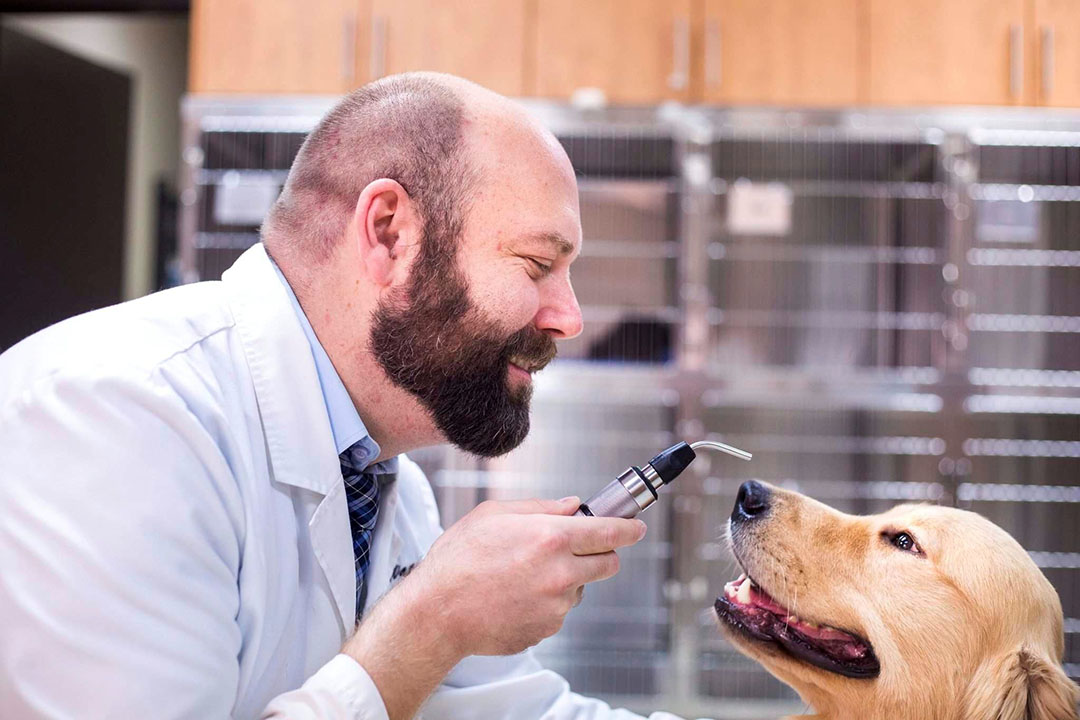
WCVM grad recognized for animal welfare work
Manitoba veterinarian Dr. Jonas Watson has made philanthropy a priority throughout his veterinary career, and these acts of service have earned him a major international award.
By Jeanette NeufeldWatson is among the 2019 recipients of the World Veterinary Association’s (WVA) Animal Welfare Award. This honour is presented annually to six veterinarians from around the globe who are working to protect and promote animal welfare. Watson is the second Canadian and the first WCVM graduate to win the award, which was created in 2017.
“To be recognized for work in the area of animal welfare in particular is especially meaningful and gratifying to me,” he says. “It means a lot to be recognized for trying to do my part to make the world a better place.”
His work extends to multiple community organizations both at home and abroad — his service has taken him to remote places in Northern Canada, to First Nations reserves across Manitoba, and abroad to Mexico and Madagascar. These travels have inspired him to make a difference close to home.
“We have big problems in our own backyard. We don’t need to travel to the most remote of locales to make real, meaningful change for a community,” he says.
Watson is president of the Manitoba Veterinary Medical Association, the vice chair of the Winnipeg Humane Society board, a director on the board of the Canadian Animal Blood Bank, and a regional co-director of Community Veterinary Outreach for Manitoba, an organization that provides veterinary and human health services to homeless or marginally-housed populations.
His journey into veterinary medicine didn’t have the typical start. While he professes a life-long love for animals, his post-secondary education began with a Bachelor of Arts degree — major in film studies, minor in philosophy. Watson has a thoughtful approach to his professional work that shines through as he discusses why he’s built his life around being of service to his community and within his profession.
“I think universal access to veterinary care is something that we as a profession should be aspiring toward. I think it should be a priority for a society that animals, wherever they are, are afforded the care that they need,” he says.
It was an experience during a fourth-year clinical rotation in anesthesia at the WCVM that helped set Watson on his path of philanthropy. The 2006 WCVM graduate credits participating in a spay-neuter clinic in the northern Saskatchewan community of Île-à-la-Crosse as one of the pivotal moments in his Doctor of Veterinary Medicine (DVM) education.
“That was a very eye-opening experience. It was one of the highlights of my four years in Saskatchewan, and [it] really clarified for me how dire the need is for veterinary services in remote parts of the country,” he says.
Born and raised in Winnipeg, Watson ultimately returned home to put down roots after starting his career in the United States. He has continued to travel, but with a two-year-old daughter now at home, he has learned how to prioritize his efforts.
Working out of Winnipeg at the Tuxedo Animal Hospital, Watson travels to places like Rankin Inlet, Nunavut, and to the northern Manitoba communities of Churchill and Gillam where he provides both fee-for-service and non-profit veterinary care.
“They have no access to the basic veterinary medical services that the rest of us take for granted, so animals end up succumbing to totally preventable diseases and trauma. This is bad for the animals themselves, but it also isn’t good for the people that have to bear witness to this,” he says.
Watson is highly aware of the idea of the interconnectedness between human and animal wellbeing, and the concept of One Health is encompassed in much of his volunteer work.
“This notion of One Welfare, kind of like One Health, resonates deeply with me, and really supports the elevation of veterinary medicine as a vital social service in my estimation,” he says.
Watson was nominated for the international award by the Canadian Veterinary Medical Association. He accepted the honour on April 28 at the annual WVA Congress in San José, Costa Rica. The award, which includes a 5,000 Euro prize, was sponsored by Ceva Santé Animale.
